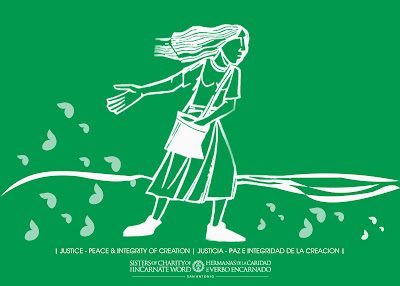Today is the World Day of Prayer for the Care of Creation! Let's pray, educate ourselves, respond, and celebrate together this Season of Creation (Sept 1 - Oct 4)!
Sister Martha Ann shares this superb reflection written by Barbara Brown Taylor. Sr. Martha Ann says: "think of our JPIC image of the woman throwing seed"
The Sower’s Generosity
Author and preacher Barbara Brown Taylor considers her usual response to the parable of the Sower scattering seed on different types of ground. Gospel passage (Matthew 18–23).
I started worrying about what kind of ground I was on with God. I started worrying about how many birds were in my field, how many rocks, how many thorns. I started worrying about how I could clean them all up, how I could turn myself into a well-tilled, well-weeded, well-fertilized field for the sowing of God’s word. I started worrying about how the odds were three to one against me—those are the odds in the parable, after all—and I began thinking about how I could beat the odds . . . by cleaning up my act.
That is my usual response to this parable. I hear it as a challenge to be different, as a call to improve my life, so that if the same parable were ever told about me it would have a happier ending, with all of the seed falling on rich, fertile soil. But there is something wrong with that reading of the parable, because if that is what it is about, then it should be called the parable of the different kinds of ground.
I started worrying about what kind of ground I was on with God. I started worrying about how many birds were in my field, how many rocks, how many thorns. I started worrying about how I could clean them all up, how I could turn myself into a well-tilled, well-weeded, well-fertilized field for the sowing of God’s word. I started worrying about how the odds were three to one against me—those are the odds in the parable, after all—and I began thinking about how I could beat the odds . . . by cleaning up my act.
That is my usual response to this parable. I hear it as a challenge to be different, as a call to improve my life, so that if the same parable were ever told about me it would have a happier ending, with all of the seed falling on rich, fertile soil. But there is something wrong with that reading of the parable, because if that is what it is about, then it should be called the parable of the different kinds of ground.
Taylor asks whether our familiar interpretation may miss the more dramatic message of God’s radical grace:
Instead, it has been known for centuries as the parable of the Sower, which means there is a chance, just a chance, that we have got it all backwards. We hear the story and think it is a story about us, but what if we are wrong? What if it is not about us at all but about the sower? What if it is not about our own successes and failures and birds and rocks and thorns but about the extravagance of a sower who does not seem to be fazed by such concerns, who flings seed everywhere, wastes it with holy abandon, who feeds the birds, whistles at the rocks, picks his way through the thorns, shouts hallelujah at the good soil and just keeps on sowing, confident that there is enough seed to go around, that there is plenty, and that when the harvest comes at last it will fill every barn in the neighborhood to the rafters?
If this is really the parable of the Sower and not the parable of the different kinds of ground, then it begins to sound quite new. The focus is not on us and our shortfalls but on the generosity of our maker, the prolific sower who does not obsess about the condition of the fields, who is not stingy with the seed but who casts it everywhere, on good soil and bad, who is not cautious or judgmental or even very practical, but who seems willing to keep reaching into his seed bag for all eternity, covering the whole creation with the fertile seed of his truth.
If this is really the parable of the Sower and not the parable of the different kinds of ground, then it begins to sound quite new. The focus is not on us and our shortfalls but on the generosity of our maker, the prolific sower who does not obsess about the condition of the fields, who is not stingy with the seed but who casts it everywhere, on good soil and bad, who is not cautious or judgmental or even very practical, but who seems willing to keep reaching into his seed bag for all eternity, covering the whole creation with the fertile seed of his truth.
Barbara Brown Taylor, The Seeds of Heaven: Sermons on the Gospel of Matthew (Louisville, KY: Westminster John Knox Press, 2004), 25–26.

No comments:
Post a Comment